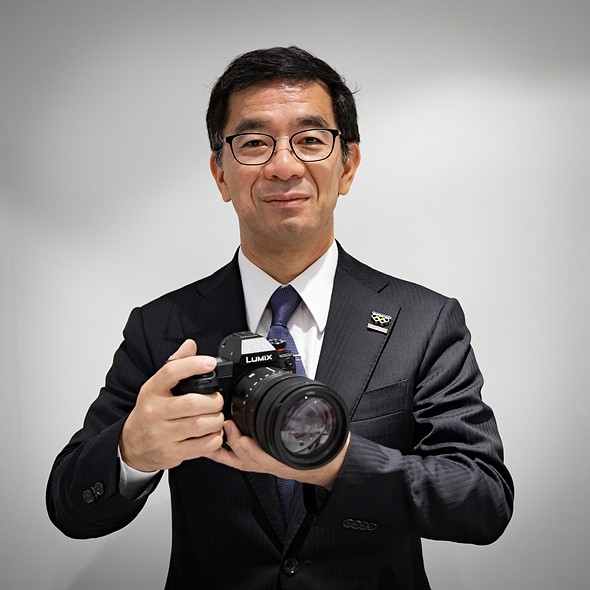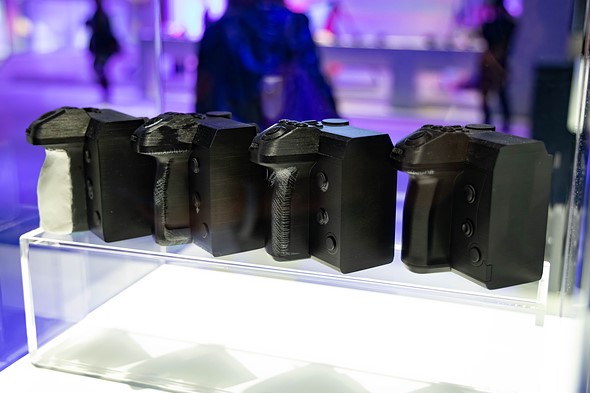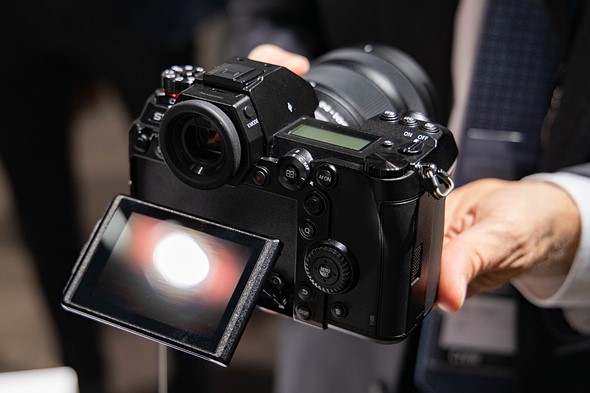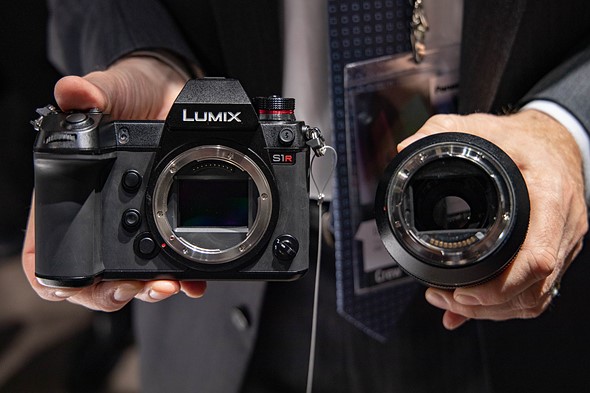포토키나 2018때 DPReview가 진행했던 인터뷰 기사가 2019/1/3일에 업데이트 되었습니다.
파나소닉 S1/S1R의 공식 발매가 가까워지고 있는 만큼... 뒤돌아보는 의미에서...
원문 그대로 올립니다.읭?
원문링크 : https://www.dpreview.com/interviews/6533264821/panasonic-interview-we-are-targeting-the-very-highest-level-of-durability-in-the-industry

Yosuke Yamane, President of Panasonic's Imaging Network Business Division.
With the official launch of Panasonic's new full-frame S1 and S1R getting close, we're looking back to Photokina 2018, where we sat down with Yosuke Yamane, President of Panasonic's Imaging Network Business Division. In our interview, Mr. Yamane discusses his hopes for the future, why Panasonic decided to go full-frame, and the challenges facing his industry.
Why did Panasonic make the decision to move into full-frame?
Five years ago, full-frame mirrorless cameras entered the market, and the trend [since then] has been moving towards full-frame mirrorless cameras. But at that time, we were not ready. Both in terms of technology, and also service and support, and so on. But now the time has come when our technology is ready to go.
As you know, since we joined the camera business, we have introduced several worlds first technologies. [Full-frame] is a new challenge for us as an innovator. We believe that we can provide value in the full-frame camera market.
You've said that the ’S’ stands for specialized - what are these cameras specialized for?
They’re specialized for professionals. That is a core target for us but we’re also targeting high-end amateurs and enthusiasts.
"Operability without compromise"
What is your strategy for attracting professionals?
Everything without compromise. Image quality, build quality, operability and performance. It takes all of our effort. As for image quality, we’re using newly developed 47 and 24MP full-frame sensors, and also a new processing engine, plus a high-quality lens lineup. And 4K 60p video. Fast, and very accurate autofocus, which is a combination of high-speed contrast detection autofocus and DFD technology. And this also includes deep learning Ai. Plus dual image stabilization and a high-precision, high-speed shutter.
Also a very high resolution viewfinder - the highest-precision finder in the industry. Dual card slots, SD and XQD, which is essential for professionals, and a 3-axis tilting LCD. Operability without compromise.
Our designers ran a lot of simulations and made a lot of prototypes of the grip, for example, to fit the needs of professional photographers. Also optimal button layout, for intuitive controls.

Is there a technical reason for the unusually large body size of the S1 and S1R?
DSLRs incorporate mirror boxes, but we have double card slots, an in-body stabilization system and high-quality movie features. So the body obviously gets bigger because of those features. We didn’t want to compromise on features for the sake of body size. Maybe some customers think that mirrorless cameras should be small, but we think that as a professional tool, this body size is appropriate.
The advice from professionals is that they place more importance on performance, not size
We have made this camera with our Lumix ambassadors. We got a lot of feedback from them and most of the professionals don’t feel that [these cameras are] ‘big’. They feel that they are a very appropriate size.
The advice from professionals is that they place more importance on performance, not size. For example the shutter. Most competitive cameras are guaranteed to 200,000 actuations. Our camera will be tested for more. That’s the kind of thing that we prioritize, for professional use.
Is it your intention that the S1 and S1R will be the most durable cameras on the market, when they’re released?
Yes. We are targeting the very highest level of durability in the industry. [The S1/R] are entirely sealed to be dust and splash resistant, and operate in very low temperatures - even exceeding the limits of the GH5. The GH5 actually went to the South Pole in minus 40 degrees C, and worked perfectly. Such kinds of ‘no compromise’ features are all incorporated [in the S1/R].
There are a lot of photographers taking landscapes, sports, and nature, and we're gathering feedback from all of them. The cameras need to work in all kinds of conditions from very warm to very cold. So we focus on all of the requests from consumers with the intention of making [these cameras] without any compromise.

Do you think that over time, your L mount lineup will grow to include entry-level products, or do you see it purely as a high-end system?
The first generation will be specialized for professionals but in the future, of course we’re also aiming to attract entry-level users. In that eventually, we’ll study the question of performance versus size. But our image to professional users is very important. That’s why we’re attacking this segment [initially].
We decided that it was better to collaborate, than to create our own standalone mount
What is the strategic value of the L mount alliance, to Panasonic?
We’ve had a good relationship with Leica for a long time - 17 years. Four years ago we renewed our contract. That contract included a technical collaboration, with our digital technology and their optical technology. There will be a convergence. In that contract we discussed a lot of things relating to the shared mount.
Sigma produces very reliable high quality lenses, [and we knew that] in order to get into the new business, we needed a lineup of lenses. So we decided to collaborate with Sigma to make a big impact. I have a good relationship with Mr Yamaki, CEO of Sigma, I trust him and I respect his aggressiveness towards the market. This collaboration provides a lot of value for us, entering into a new market and becoming competitive in full-frame.
Considering value for customers, we decided that it was better to collaborate, than to create our own standalone mount. This way we can provide lots of choices for lenses, and Sigma already has a large fanbase. Obviously Leica with its 100 year history also has a good base of users.
The Leica L mount lineup includes APS-C products as well as full-frame. Is Panasonic interested in APS-C?
No. We have our own Micro Four Thirds system and we think that [because of the greater difference in size between full-frame and M43] this is the best balance. We have no plans to develop APS-C products.
In M43, we prioritize compactness. But in full-frame we set higher targets, to meet professional specifications
Is designing lenses for full-frame easier or more difficult than designing for Micro Four Thirds?
It’s more difficult. In the case of M43, we prioritize compactness. But in full-frame we set higher targets, to meet professional specifications. This camera [the S1R] incorporates a 47MP sensor, but to be futureproof, lenses should be capable of resolving more resolution than that. So we set very high specification targets for our full-frame lenses. We will develop our lenses without compromise. Other important factors are build-quality, and bokeh. These are both very important when it comes to creating photographs.
Do you think Panasonic’s L-mount lineup could evolve in future to include products like the GH5S, which are optimized for video?
One of our assets is our experience of professional video, over more than 40 years. This is one of the areas where we contribute to the market, so in the future it’s possible that [our L-mount lineup] will expand to include such products. But even the S1 has very good video capabilities. We cannot disclose the exact specification beyond saying that it will be capable of 4K/60p video but you can expect more. Even the S1 will be used, we believe, by professional videographers.

The sensors inside the S1 and S1R are described as ‘newly developed’. Are they fabricated by Panasonic?
We cannot disclose that. I would love to tell you but I can’t - you’ll just have to imagine! Obviously we have sensor-manufacturing experience, but I can’t disclose anything. Even if we outsourced [sensor fabrication] the design would still be to our specifications. Picture quality is not only determined by the sensor. There’s also lens design, and processing technology.
Can you explain how Panasonic and Leica work together in terms of lens design?
Mainly, optical technologies and manufacturing technologies come from Leica. We provide our digital technology and interface technology to them. For the full-frame lenses, we designed them by ourselves, but the DNA of Leica is incorporated - of course.
Is there any Panasonic DNA in Leica products?
I don’t know if they would admit that, but we do provide it! All of the Leica-branded lenses for our Micro Four Thirds system are checked according to Leica’s standards, and we have learned a lot through that process.
What are the biggest challenges facing Panasonic?
As you know, in the camera industry we don’t have a large market share compared to the likes of Canon and Nikon. They have much more history compared to ours - we've only been in the industry for 17 years. Our brand recognition is also not so high. However, a paradigm change has finally arrived. Canon and Nikon are creating new mirrorless systems, and we’re entering a new world thanks to the L mount alliance. This is a new start for the camera industry.
Our slogan is 'changing photography'. We want to create a new photo culture for the digital generation. In the full-frame world, I think that customers will appreciate our contribution. Rather than competing with Canon and Nikon we’re focused on conveying that message to the customer.
We want to create a new photo culture for the digital generation
When it comes to product planning, we have to anticipate how customers behavior will change in the future. These models [the S1 and S1R] are focused on professionals. We have to anticipate how professional photography and videography will change, and we’re constantly looking at those trends, and anticipating how professional behavior will change. And as professionals change, customers at the entry and mid-levels will change, too. We have to watch this very carefully, and we always plan our products in line with changing customer trends.
What do you think are the biggest opportunities for Panasonic?
The Olympic Games in 2020 will be a very big opportunity to showcase Panasonic’s technologies. I was born in 1964, which was the year of the last Tokyo Olympics. We will use the 2020 games as an opportunity to enhance our video technologies and photo technologies. After the Olympics, we will create a new generation of 8K video cameras, which are currently in development.
Editors' note: Barnaby Britton
Panasonic is one of the most interesting companies in the photo industry. Although it enjoys only a modest share of the market compared to 'giants' like Canon and Nikon, Panasonic has consistently surprised us with its energy and innovation - particularly in the high-end video/stills space. Arguably, Panasonic is the only company that could have created the powerful GH5, and it's hard to imagine another company having the confidence to make the even more narrowly-specialized GH5S.
When it comes to high-end video capture in mirrorless cameras, Panasonic has been (along with Sony) a driving force in the industry, and that's thanks to the company's long experience in the video realm. While Lumix as a brand is less than 20 years old, Panasonic has been involved in video, in some way or another, for more than twice that long.
The fact that Panasonic's forthcoming S1 and S1R mirrorless ILCs will both offer powerful 4K video feature sets is not a surprise. What's interesting is that they're built around full-frame sensors. I'm inclined to think that moving into full-frame is a good decision for Panasonic, but it's risky. I agree with Mr. Yamate that moving forward in partnership with Leica and Sigma will add more value to the market for enthusiast and professional photographers than creating yet another new lens mount, while also mitigating the potential risks of going it alone.
Promising the highest level of durability in the industry and plenty of advanced features, the S-system has the potential to seriously challenge the 'giants'
While there are plenty of full-frame mirrorless systems available in late 2018, there is a conspicuous gap in the market when it comes to full-frame video systems. It is doubtful whether Nikon will try (or even feel the need to try) to create a video-oriented ILC in the near future, and Sony seems to have (probably only temporarily) paused the development of its a7S lineup.
Panasonic, with its decades of experience making video cameras, must be keen to put a product into that gap. If the company's intention is to lead the way in full frame video, similar to what it did with the GH series for Micro Four Thirds, it has the potential to disrupt the full frame market more than its current industry share might suggest. Joining the L-mount alliance is a great first step.
But that's the future. For now, Mr. Yamane's company is dedicated to making the S1 and S1R as attractive as possible to professional photographers.
---------------------------------------------------------------------------------------------------------------------------------------------------------------------------
구글신 be with you.

회원정보
아이디 : aerill***
닉네임 : 박정우_눈먼냥이
포인트 : 256426 점
레 벨 : 최우수회원(레벨 : 6)
가입일 : 2015-03-12 12:14
포토앨범보기 쪽지보내기